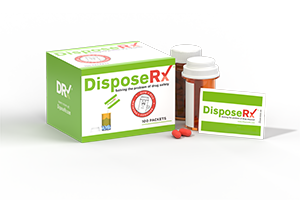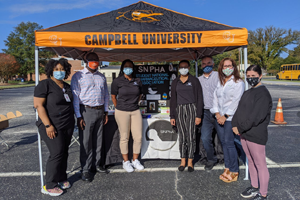At-home Disposal Kits Increase Proper Opioid Disposal
At the Perelman School of Medicine at the University of Pennsylvania, Lead Researcher Anish K. Agarwal, MD, MPH, saw that after surgery, many patients kept leftover medications in the home increasing the risk of drug addiction and abuse. Agarwal wanted to find whether sending patients a disposal kit could prompt them to properly dispose of the unneeded opioids. His team sent $2 kits to over 200 patients and found that 62% more patients reported they properly disposed of their medications taking almost 500 unused tables off the streets.
Mailing medication disposal kits to patients increased safe opioid disposal by an average of 62%.
Key Data Findings
Read the Research study on JAMA Network Open, “Effect of Mailing an At-home Disposal Kit on Unused Opioid Disposal After Surgery – A Randomized Clinical Trial“
Distributing Packets and Education Boost Medication Disposal
As part of an Opioid Stewardship Initiative, researchers at the Shriners for Children Medical Center in Pasadena, CA wanted to find if giving medication disposal kits with prescriptions could reduce unused medications in the home. Researchers gave DisposeRx packets, an instructional flyer, and offered counseling to opioid prescription recipients and then followed up by phone. As a result, 92% of the participants reported using the provided DisposeRx to dispose of leftover medications.
Providing patients with packets, education materials, and awareness boosts medication disposal to a 92% disposal rate.
Key Data Findings
Read the Research study in the Journal of the Pediatric Orthopaedic Society of North America, “Preventing Opioid Diversion and Abuse by Using an At-home Opioid Disposal Method: An Improvement Project in a Pediatric Outpatient Surgical Center“
Journal of Nursing Administration
Packets, Follow-ups, and Instructional Materials Increase Disposal Up to 71%
Researcher John M. Edwards III, DNAP, CRNA surveyed almost 300 articles about opioid and medical waste disposal and found 8 to be applicable for his review. Of those, Edwards found all eight research studies indicate in-home opioid disposal systems provided by a healthcare facility produce proper medication disposal rates up to 71%.
Key Data Findings
Read the Research study Surgical Patient Compliance with Healthcare Facility-Provided In-home Opioid Disposal Products: A Systematic Review.
- Compared to control group.
- Includes cost of postage, flyer and packet.
- Kit included flyer and packet.
- Zhang DA, Luong M, Barragan E, Bushnell F, Cho R, Poon S. Disposal of unused opioids using an at-home disposal method. J Pediatr Soc North Am. 2021;3(1).
- Brummett CM, Steiger R, Englesbe M, et al. Effect of an activated charcoal bag on disposal of unused opioids after an outpatient surgical procedure: a randomized clinical trial. JAMA Surg. 2019;154(6):558-561.
- Hite M, Dippre A, Heldreth A, et al. A multifaceted approach to opioid education, prescribing, and disposal for patients with breast cancer undergoing surgery. J Surg Res (Houst). 2021;257:597-604.v
- Voepel-Lewis T, Farley FA, Grant J, et al. Behavioral Intervention and Disposal of Leftover Opioids: A Randomized Trial. Pediatrics. 2020;145(1):e20191431.
- AdlerAC, Yamani AN, Sutton CD, Guffey DM, Chandrakantan A. Mail-back envelopes for retrieval of opioids after pediatric surgery. Pediatrics. 2020;145(3):e20192449.
DisposeRx encourages evidence based programs that make a difference
DisposeRx currently offers evidence-based turn-key solutions for opioid abatement programs across the country. Programs like Friday Night Lights Against Opioids in Texas and Pharmacy reimbursement programs in Iowa, and offer states an effective prevention method often covered by State Opioid Response Grants (SOR).
If you have an idea for a research study that can help reduce adverse medication events and improve family safety, please reach out today.





